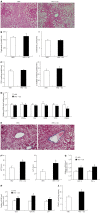Garcinia Cambogia attenuates diet-induced adiposity but exacerbates hepatic collagen accumulation and inflammation
- PMID: 23922466
- PMCID: PMC3732841
- DOI: 10.3748/wjg.v19.i29.4689
Garcinia Cambogia attenuates diet-induced adiposity but exacerbates hepatic collagen accumulation and inflammation
Abstract
Aim: To investigate long-term effects of Garcinia Cambogia (GC), weight-loss supplement, on adiposity and non-alcoholic fatty liver disease in obese mice.
Methods: Obesity-prone C57BL/6J mice were fed a high-fat diet (HFD, 45 kcal% fat) with or without GC (1%, w/w) for 16 wk. The HFD contained 45 kcal% fat, 20 kcal% protein and 35 kcal% carbohydrate. They were given free access to food and distilled water, and food consumption and body weight were measured daily and weekly, respectively. Data were expressed as the mean ± SE. Statistical analyses were performed using the statistical package for the social science software program. Student's t test was used to assess the differences between the groups. Statistical significance was considered at P < 0.05.
Results: There were no significant changes in body weight and food intake between the groups. However, the supplementation of GC significantly lowered visceral fat accumulation and adipocyte size via inhibition of fatty acid synthase activity and its mRNA expression in visceral adipose tissue, along with enhanced enzymatic activity and gene expression involved in adipose fatty acid β-oxidation. Moreover, GC supplementation resulted in significant reductions in glucose intolerance and the plasma resistin level in the HFD-fed mice. However, we first demonstrated that it increased hepatic collagen accumulation, lipid peroxidation and mRNA levels of genes related to oxidative stress (superoxide dismutase and glutathione peroxidase) and inflammatory responses (tumor necrosis factor-α and monocyte chemoattractant protein-1) as well as plasma alanine transaminase and aspartate transaminase levels, although HFD-induced hepatic steatosis was not altered.
Conclusion: GC protects against HFD-induced obesity by modulating adipose fatty acid synthesis and β-oxidation but induces hepatic fibrosis, inflammation and oxidative stress.
Keywords: Anti-adiposity; Garcinia Cambogia; Hepatic collagen accumulation; Hepatic inflammation; Hepatic oxidative stress; Metabolic changes.
Figures





Comment in
-
Hydroxycitric acid does not promote inflammation or liver toxicity.World J Gastroenterol. 2013 Nov 28;19(44):8160-2. doi: 10.3748/wjg.v19.i44.8160. World J Gastroenterol. 2013. PMID: 24307814 Free PMC article.
Similar articles
-
Risks Associated with the Use of Garcinia as a Nutritional Complement to Lose Weight.Nutrients. 2021 Jan 29;13(2):450. doi: 10.3390/nu13020450. Nutrients. 2021. PMID: 33572973 Free PMC article. Review.
-
Hydroxycitric acid does not promote inflammation or liver toxicity.World J Gastroenterol. 2013 Nov 28;19(44):8160-2. doi: 10.3748/wjg.v19.i44.8160. World J Gastroenterol. 2013. PMID: 24307814 Free PMC article.
-
Red pitaya betacyanins protects from diet-induced obesity, liver steatosis and insulin resistance in association with modulation of gut microbiota in mice.J Gastroenterol Hepatol. 2016 Aug;31(8):1462-9. doi: 10.1111/jgh.13278. J Gastroenterol Hepatol. 2016. PMID: 26699443
-
Garcinia cambogia extract ameliorates visceral adiposity in C57BL/6J mice fed on a high-fat diet.Biosci Biotechnol Biochem. 2008 Jul;72(7):1772-80. doi: 10.1271/bbb.80072. Epub 2008 Jul 7. Biosci Biotechnol Biochem. 2008. PMID: 18603810
-
Pyridostigmine attenuated high-fat-diet induced liver injury by the reduction of mitochondrial damage and oxidative stress via α7nAChR and M3AChR.J Biochem Mol Toxicol. 2024 Mar;38(3):e23671. doi: 10.1002/jbt.23671. J Biochem Mol Toxicol. 2024. PMID: 38454809 Review.
Cited by
-
New Dietary Supplements for Obesity: What We Currently Know.Curr Obes Rep. 2016 Jun;5(2):262-70. doi: 10.1007/s13679-016-0214-y. Curr Obes Rep. 2016. PMID: 27053066 Review.
-
Hepatotoxicity associated with Garcinia cambogia: A case report.World J Hepatol. 2019 Nov 27;11(11):735-742. doi: 10.4254/wjh.v11.i11.735. World J Hepatol. 2019. PMID: 31772720 Free PMC article.
-
Risks Associated with the Use of Garcinia as a Nutritional Complement to Lose Weight.Nutrients. 2021 Jan 29;13(2):450. doi: 10.3390/nu13020450. Nutrients. 2021. PMID: 33572973 Free PMC article. Review.
-
Rind from Purple Mangosteen (Garcinia mangostana) Attenuates Diet-Induced Physiological and Metabolic Changes in Obese Rats.Nutrients. 2021 Jan 22;13(2):319. doi: 10.3390/nu13020319. Nutrients. 2021. PMID: 33499382 Free PMC article.
-
Medicinal Potential of Garcinia Species and Their Compounds.Molecules. 2020 Oct 1;25(19):4513. doi: 10.3390/molecules25194513. Molecules. 2020. PMID: 33019745 Free PMC article. Review.
References
-
- Gallagher EJ, Leroith D, Karnieli E. Insulin resistance in obesity as the underlying cause for the metabolic syndrome. Mt Sinai J Med. 2010;77:511–523. - PubMed
-
- World Health Organization. Global Strategy on Diet, Physical Activity and Health. Available from: http: //www.who.int/dietphysicalactivity/media/en/gsfs_obesity.pdf.
-
- Pillitteri JL, Shiffman S, Rohay JM, Harkins AM, Burton SL, Wadden TA. Use of dietary supplements for weight loss in the United States: results of a national survey. Obesity (Silver Spring) 2008;16:790–796. - PubMed
-
- Pittler MH, Schmidt K, Ernst E. Adverse events of herbal food supplements for body weight reduction: systematic review. Obes Rev. 2005;6:93–111. - PubMed
-
- Hurt RT, Wilson T. Geriatric obesity: evaluating the evidence for the use of flavonoids to promote weight loss. J Nutr Gerontol Geriatr. 2012;31:269–289. - PubMed
Publication types
MeSH terms
Substances
LinkOut - more resources
Full Text Sources
Other Literature Sources
Medical
Research Materials
Miscellaneous

